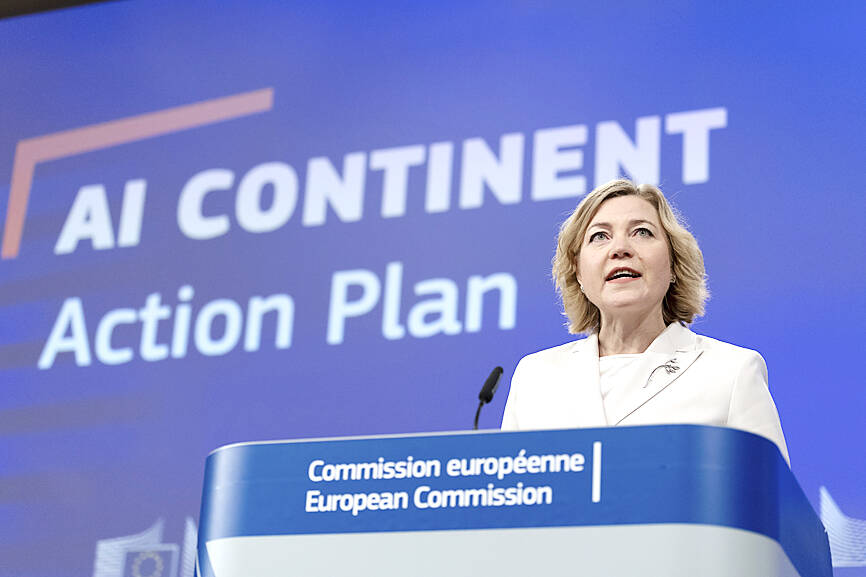The EU has revealed details of a 20 billion euro (US$22 billion) plan to create new sites equipped with vast supercomputers in Europe to develop the next generation of artificial intelligence (AI) models, while opening the door to amending its landmark law that regulates the technology.
Publishing a strategy to turn Europe into an “AI continent,” European Commissioner for Tech Sovereignty, Security and Democracy Henna Virkkunen said the technology was at the heart of making Europe more competitive, secure and technologically sovereign, adding: “The global race for AI is far from over.”
The EU is attempting to catch up with the US and China, which have taken the lead in pioneering the technology that increasingly powers shopping Web sites and self-driving cars, generates text, and is predicted to play a transformative role in healthcare, security, defense and advanced manufacturing, among other sectors.

Photo: AP
The US has a commanding lead in AI, far ahead of China. A report from Stanford University this week showed that 40 “notable AI models” — meaning influential — were produced by institutions in the US last year, compared with 15 in China and three in Europe (all French).
In a separate report last year, Stanford found that no EU country made the top five for “vibrancy” in AI, a metric that considered private investment, patents and research. It ranked the UK in third place behind the US and China, with France in sixth place and Germany eighth.
India and the United Arab Emirates ranked fourth and fifth respectively, while South Korea ranked seventh.
The EU has already embarked on a plan to build 13 AI factories — sites with supercomputers and data centers, where researchers develop and test AI models.
The new AI “gigafactories” would be much larger, targeting what the commission called “moonshots”: significant innovations in healthcare, biotech, industry, robotics and scientific discovery.
While the best-performing AI factories have supercomputers equipped with up to 25,000 advanced AI processors, a gigafactory would exceed 100,000 AI processors, the strategy document said.
These power-hungry facilities, which can require huge amounts of water for cooling, should run “as much as possible” on a green energy supply, an EU official said, with plans for “recycling” water if it was used.
Last year, 47 percent of electricity generated in the EU came from renewable sources, but campaigners fear that power-hungry data centers could undermine Europe’s climate ambitions.
“Europe has made some strides towards fully renewable electricity, and still has a long way to go, but this could all be undone by ballooning energy consumption,” said John Hyland, a Greenpeace spokesperson.
“Every power-guzzling data center risks being a lifeline to polluting power plants, well illustrated in Ireland where they consume over one-fifth of the electricity,” he added.
EU officials envisage three to five AI gigafactories in the EU at a cost of about 3 to 5 billion euros each, compared with 600 million euros for the biggest AI factory. The commission is seeking to raise 20 billion euros, using public money to incentivize private investors, via a facility provided by the European Investment Bank.
The bloc is also seeking to develop European-made AI semiconductors, advanced chips that are vital for AI factories.
However, the commission faced criticism for indicating an openness to rethink its AI Act. The regulation, which aims to control the risks posed by AI, was approved by the European Parliament only last year and would not be fully applicable until August 2027.
The commission on Wednesday said it was launching a consultation on “possible simplification” of the AI Act, as part of a wider drive to cut red tape amid concerns about Europe’s lagging economic growth.
The European Consumer Organization (BEUC) said the commission needed to focus on the implementation and enforcement of the AI Act.
“Much of the AI Act does not even apply yet, but the commission is already signaling that it is open to cutting some of its requirements. When we know that consumers worry about how AI could be used to harm them, the commission should instead be trying to reassure consumers,” said Frederico Oliveira da Silva, head of digital policy at BEUC.
Virkkunen said the commission was “very committed” to the risk-based approach and the main principles of the AI Act, but was looking at whether there were some administrative burdens or reporting obligations that could be cut to make life easier for businesses.

‘EYE FOR AN EYE’: Two of the men were shot by a male relative of the victims, whose families turned down the opportunity to offer them amnesty, the Supreme Court said Four men were yesterday publicly executed in Afghanistan, the Supreme Court said, the highest number of executions to be carried out in one day since the Taliban’s return to power. The executions in three separate provinces brought to 10 the number of men publicly put to death since 2021, according to an Agence France-Presse tally. Public executions were common during the Taliban’s first rule from 1996 to 2001, with most of them carried out publicly in sports stadiums. Two men were shot around six or seven times by a male relative of the victims in front of spectators in Qala-i-Naw, the center

Canadian Prime Minister Mark Carney is leaning into his banking background as his country fights a trade war with the US, but his financial ties have also made him a target for conspiracy theories. Incorporating tropes familiar to followers of the far-right QAnon movement, conspiratorial social media posts about the Liberal leader have surged ahead of the country’s April 28 election. Posts range from false claims he recited a “satanic chant” at a campaign event to artificial intelligence (AI)-generated images of him in a pool with convicted sex offender Jeffrey Epstein. “He’s the ideal person to be targeted here, for sure, due to

DISPUTE: Beijing seeks global support against Trump’s tariffs, but many governments remain hesitant to align, including India, ASEAN countries and Australia China is reaching out to other nations as the US layers on more tariffs, in what appears to be an attempt by Beijing to form a united front to compel Washington to retreat. Days into the effort, it is meeting only partial success from countries unwilling to ally with the main target of US President Donald Trump’s trade war. Facing the cratering of global markets, Trump on Wednesday backed off his tariffs on most nations for 90 days, saying countries were lining up to negotiate more favorable conditions. China has refused to seek talks, saying the US was insincere and that it

Australia’s opposition party yesterday withdrew election promises to prevent public servants from working from home and to slash more than one in five federal public-sector jobs. Opposition leader Peter Dutton announced his conservative Liberal Party had dropped its pledge that public servants would be required to work in their offices five days a week except in exceptional circumstances. “I think we made a mistake in relation to this policy,” Dutton told Nine Network television. “I think it’s important that we say that and recognize it, and our intention was to make sure that where taxpayers are working hard and their money is